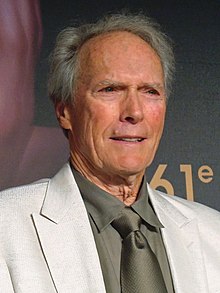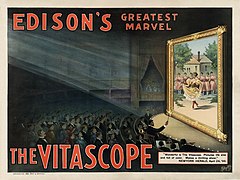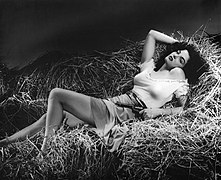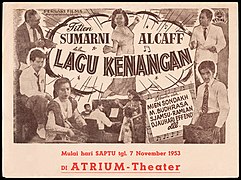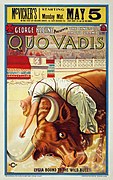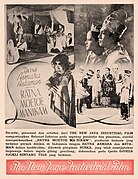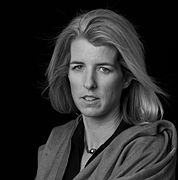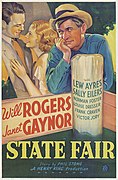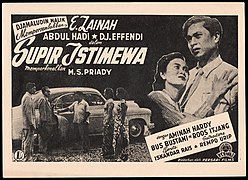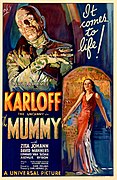Portal:Film
The Film Portal
 A film – also called a movie, motion picture, moving picture, picture, photoplay or (slang) flick – is a work of visual art that simulates experiences and otherwise communicates ideas, stories, perceptions, feelings, beauty, or atmosphere through the use of moving images. These images are generally accompanied by sound and, more rarely, other sensory stimulations. The word "cinema", short for cinematography, is often used to refer to filmmaking and the film industry, and the art form that is the result of it. (Full article...)
A film – also called a movie, motion picture, moving picture, picture, photoplay or (slang) flick – is a work of visual art that simulates experiences and otherwise communicates ideas, stories, perceptions, feelings, beauty, or atmosphere through the use of moving images. These images are generally accompanied by sound and, more rarely, other sensory stimulations. The word "cinema", short for cinematography, is often used to refer to filmmaking and the film industry, and the art form that is the result of it. (Full article...)
Featured articles -
Star Trek is a 2009 American science fiction action film directed by J. J. Abrams and written by Roberto Orci and Alex Kurtzman. It is the 11th film in the Star Trek franchise, and is also a reboot that features the main characters of the original Star Trek television series portrayed by a new cast, as the first in the rebooted film series. The film follows James T. Kirk (Chris Pine) and Spock (Zachary Quinto) aboard the USS Enterprise as they combat Nero (Eric Bana), a Romulan from their future who threatens the United Federation of Planets. The story takes place in an alternate reality that features both an alternate birth location for James T. Kirk and further alterations in history stemming from the time travel of both Nero and the original series Spock (Leonard Nimoy). The alternate reality was created in an attempt to free the film and the franchise from established continuity constraints while simultaneously preserving original story elements.
The idea for a prequel film which would follow the Star Trek characters during their time in Starfleet Academy was discussed by series creator Gene Roddenberry in 1968. The concept resurfaced in the late 1980s, when it was postulated by Harve Bennett as a possible plotline for what would become Star Trek VI: The Undiscovered Country, but it was rejected in favor of other projects by Roddenberry. Following the critical and commercial failure of Star Trek: Nemesis and the cancellation of Star Trek: Enterprise, the franchise's executive producer Rick Berman and screenwriter Erik Jendresen wrote an unproduced film titled Star Trek: The Beginning, which would take place after Enterprise. After the separation of Viacom and CBS Corporation in 2005, former Paramount Pictures president Gail Berman convinced CBS to allow Paramount to produce a new film in the franchise. Orci and Kurtzman were soon approached to write the film, and Abrams was approached to direct it. Kurtzman and Orci used inspiration from novels and graduate school dissertations, as well as the series itself. Principal photography commenced on November 7, 2007, and ended on March 27, 2008. The film was shot in locations around California and Utah. Abrams wanted to avoid using bluescreen and greenscreen, opting to use sets and locations instead. Heavy secrecy surrounded the film's production and was under the fake working title Corporate Headquarters. Industrial Light & Magic used digital ships for the film, as opposed to miniatures used in most of the previous films in the franchise. Production for the film concluded by the end of 2008. (Portal:Film/Featured content)
General images -
Selected image

American bison ("buffalo") galloping - set to motion using photos by Eadweard Muybridge. Muybridge was an English-born photographer, known primarily for his early use of multiple cameras to capture motion, and his zoopraxiscope, a device for projecting motion pictures that pre-dated the celluloid film strip that is still used today.
Did you know...
- ... that voice actress Mako Morino played volleyball for 14 years, but gave up the goal of playing professionally after being assigned to the non-serving libero position?
- ... that the projector at the Walter Reade Theater had to be modified to screen Nathaniel Dorsky's short film Triste?
- ... that Chabacano metro station has a composition named after it and it served as a film location for the 1990 film Total Recall?
- ... that Let's All Go to the Lobby, a one-minute filmed advertisement, has been preserved by the US National Film Registry?
- ... that the actor Andrew Still worked as a receptionist and janitor after leaving Hollyoaks?
Selected biography -
Ruth Elizabeth "Bette" Davis (/ˈbɛti/; April 5, 1908 – October 6, 1989) was an American actress of film, television, and theater. Regarded as one of the greatest actresses in Hollywood history, she was noted for her willingness to play unsympathetic, sardonic characters and was known for her performances in a range of film genres, from contemporary crime melodramas to historical and period films and occasional comedies, although her greatest successes were her roles in romantic dramas. She won the Academy Award for Best Actress twice, was the first person to accrue ten Academy Award nominations for acting, and was the first woman to receive a Lifetime Achievement Award from the American Film Institute. In 1999, Davis was placed second on the American Film Institute's list of the greatest female stars of classic Hollywood cinema.
After appearing in Broadway plays, Davis moved to Hollywood in 1930, but her early films for Universal Studios were unsuccessful. She joined Warner Bros. in 1932 and had her critical breakthrough playing a vulgar waitress in Of Human Bondage (1934). Contentiously, she was not among the three nominees for the Academy Award for Best Actress that year, and she won it the following year for her performance in Dangerous (1935). In 1936, due to poor film offers, she attempted to free herself from her contract, and although she lost a well-publicized legal case, it marked the beginning of the most successful period of her career. Until the late 1940s, she was one of American cinema's most celebrated leading ladies. She was praised for her role in Marked Woman (1937) and won a second Academy Award for her portrayal of a strong-willed 1850s southern belle in Jezebel (1938), the first of five consecutive years in which she received a Best Actress nomination; the others for Dark Victory (1939), The Letter (1940), The Little Foxes (1941), and Now, Voyager (1942). (Full article...)Featured lists -
News
- September 2: Tributes paid to recently deceased US actor Chadwick Boseman
- October 7: Mockumentary Mister America has world premiere
- May 16: Actor Doris Day dies at 97
- January 22: Former U.S. intelligence agent Tony Mendez, architect of 'Argo' rescue, dies at 78
- Upcoming events
WikiProjects
Selected quote
Main topics
| Filmmaking |
|---|
 |
| Glossary |
- Terms - Animation • Beta movement • Camera • Cult film • Digital cinema • Documentary film • Dubbing • Experimental film • Fan film • Film crew • Film criticism • Film festival • Film frame • Film genre • Film journals and magazines • Film industry • Film manifesto • Film stock • Film theory • Filmmaking • History of film • Independent film • Lost film • Movie star • Narrative film • Open content film • Persistence of vision • Photographic film • Propaganda • Recording medium • Special effect • Subtitles • Sound stage • Web film • World cinema
- Lists - List of basic film topics • List of film topics • List of films • List of film festivals • List of film formats • List of film series • List of film techniques • List of highest-grossing films • List of longest films by running time • List of songs based on a film or book • Lists of film source material • List of open content films
Featured content
Subcategories
Subportals
Related portals
Things you can do
- Add
{{portal|Film}}to the See also section of film-related articles. - Tag the talk pages of film related articles with the {{WikiProject Film}} banner.
- Explore the list of English language films without an article
- Check tasks and announcements at WPFILM Announcements.
- Collaborate with other participants at Wikipedia:WikiProject Film.
- Join one of the task forces at Wikipedia:WikiProject Film/Sidebar.
Associated Wikimedia
The following Wikimedia Foundation sister projects provide more on this subject:
-
Commons
Free media repository -
Wikibooks
Free textbooks and manuals -
Wikidata
Free knowledge base -
Wikinews
Free-content news -
Wikiquote
Collection of quotations -
Wikisource
Free-content library -
Wikiversity
Free learning tools -
Wiktionary
Dictionary and thesaurus












































![Image 45Louis Poyet [fr]'s engraving of the mechanism of the "fusil photographique" as published in La Nature (april 1882) (from History of film technology)](http://upload.wikimedia.org/wikipedia/commons/thumb/f/f0/Fusil_photographique_Marey2.png/120px-Fusil_photographique_Marey2.png)












